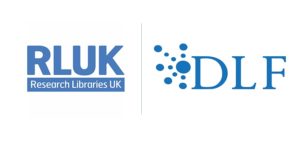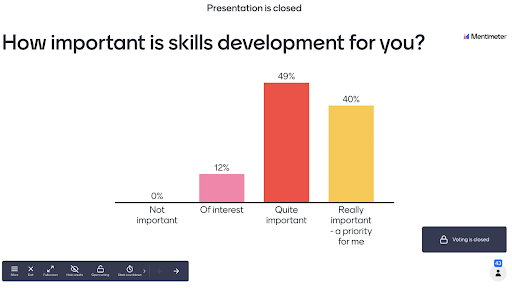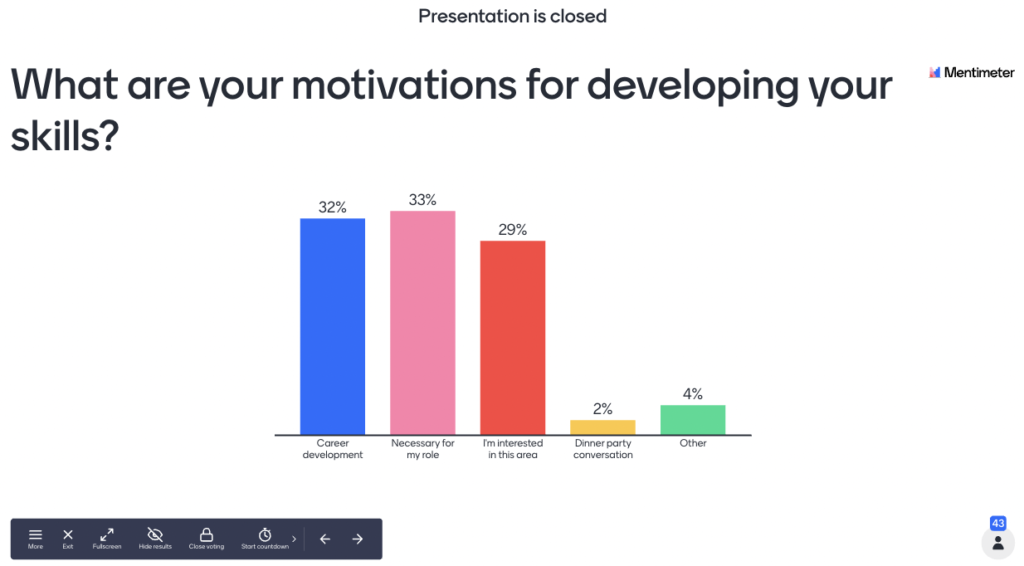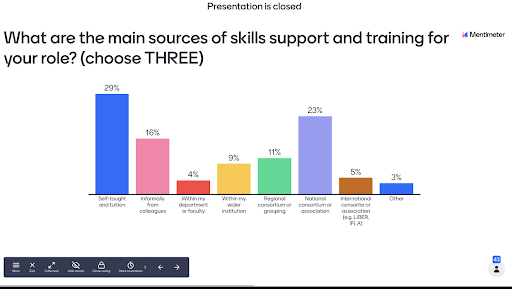
On April 26, 2021, fifty colleagues from Research Libraries UK’s Digital Scholarship Network (DSN) and CLIR’s Digital Library Federation’s Data and Digital Scholarship (DDS) working group came together to explore the possibilities and benefits of creating a transatlantic digital scholarship skills exchange.
Those working within research libraries will know that digital scholarship can be complex. As a loosely defined umbrella term, it can include a wide variety of processes, services, and applications from GIS and data mapping, to computational analysis, from the application of artificial intelligence to library processes, to research data management. As a result of its multifaceted nature, those working around digital scholarship within research libraries need a wide variety of ever changing skills to reflect the ongoing development of techniques, practices, and tools. These skills not only relate to increasingly complex technical processes, but also include more generic skills such as enabling effective advocacy, developing grant applications, and project management.
Although formal training programs and courses are available, on a wide variety of topics relating to digital scholarship, not all of these are applicable to research library environments. They can be expensive and it can sometimes be difficult to translate classroom-based learning into real-world application and practice. As a result of these challenges, a number of bespoke and tailored training and skills development programs have been created to support digital scholarship within research libraries and cultural institutions, at institutional, regional, or national levels. There is also a wealth of knowledge and expertise contained within the community, both the result of formal training, real-world experience, and self tuition.
How might we harness this wealth of collective expertise, knowledge, and experience for the mutual benefit of one another and the research library community?
Before answering this, we needed to know more about motivations.
The importance of skills development
The joint meeting began with an open question: why are we here? Why are we interested in developing our skills around digital scholarship processes and tools within research libraries? And how would a transatlantic skills exchange meet our skills needs?
Through a short mentimeter poll, colleagues immediately identified that skills development was either quite (49% of respondents) or really important to them as individuals (40%).

The motivations for skills development varied, but career development, the necessity of skills development for individual roles, and the individual passions and interest of colleagues in these areas all ranked highly.

Having established that skills development was important to colleagues, and for a variety of reasons, our final question centered on where colleagues were currently receiving their training from. Potentially reflecting the diverse and emerging nature of many digital scholarship processes and projects, colleagues gave a variety of responses from that they relied on self-tuition for their skills development (29%), learnt informally from colleagues (16%), or received training from national consortia or associations (23%).

Immediately, from this short mentimeter survey, we confirmed that:
- Skills development is important
- Colleagues are interested in developing their skills for both professional and personal reasons
- A skills exchange would sit alongside self-tuition, informal learning from colleagues, and national programs as another source of skills development.
A transatlantic skills exchange: what might it look like?
The session then considered: what might a skills exchange comprise of and are there any models from which we can learn?
Colleagues from the DLF DDS outlined the success of their consultation model, which previously formed part of the DLF’s eResearch network. The DDS consultation model is centered on the mutually beneficial exchange of expertise centered around a specific challenge or problem posted by a colleague. It enables the creation of a community of practice of colleagues working in an area through which questions or challenges can be posed, and responses made by the community.
Getting to know one another…..
The majority of the session was then dedicated to one of the most important elements of a potential skills exchange: bringing colleagues together from different institutions who had a similar interest around skills.
Through a series of small group breakout rooms (consisting of 2-5 people), colleagues came together to share their own experiences and perceptions of digital scholarship within their institutions, the areas where they would like to develop, and the topics around which they might offer their expertise.
Through a series of slightly larger groups, colleagues then discussed what the potential benefits of establishing a transatlantic skills program might be, the potential features of any such program, whether there are good examples from elsewhere from which we might learn, and how it might be sustained. Through lively and enthusiastic group discussion, a series of jamboards were quickly filled with ideas and questions.
Jamboards: https://drive.google.com/file/d/1jJ0mESLIGULMy_BWF5F4K27tSZOLV4ze/view?usp=sharing
Expression of interest: join an international community of practice
Having established the collective enthusiasm for establishing such a program, colleagues were asked to complete a short expression of interest if they were interested in participating in its first iteration.
So what happens now? Next steps?
Members of the DLF DDS and RLUK’s DSN were delighted by the positivity and enthusiasm shared on behalf of colleagues during the joint session. Colleagues embraced the opportunity of creating a transatlantic skills exchange program that was community driven, providing a safe and supportive place to share ideas, thoughts, and most importantly, challenges and problems.
Colleagues commented that it was refreshing to be able to come together with colleagues from different institutions, from another country, and find that they were experiencing the same challenges and issues as they were.
Missed the discussion? catch up below!
Watch the session presentations: https://www.youtube.com/watch?v=X9GqZWAyHBI
Register your interest (RLUK and DLF colleagues): https://bit.ly/2QGb9Km
Matt Greenhall, Deputy Executive Director, RLUK
The colleagues leading this work are:
Jason Clark, Professor, Lead for Research Informatics, Montana State University Library, and DLF DDS co-convener.
Sara Mannheimer, Data Librarian and Associate Professor, Montana State University Library, and DLF DDS co-convener.
Beth Clark, Head of Digital Scholarship, London School of Economics, and RLUK DSN member.
Susan Halfpenny, Teaching and Learning Manager, University of York, and RLUK DSN member.
Matt Greenhall, Deputy Executive Director, RLUK
Thanks go to Gayle Schechter (Program Associate, CLIR/DLF), Louisa M. Kwasigroch (Director, Outreach and Engagement at CLIR and Interim DLF Senior Program Officer), Kirsty Lingstadt (Deputy Director, University of Edinburgh and RLUK DSN co-convener), Eleonora Gandolfi (Head of Digital Scholarship, University of Southampton and RLUK DSN co-convener), and Melanie Cheung (RLUK Executive Assistant).
